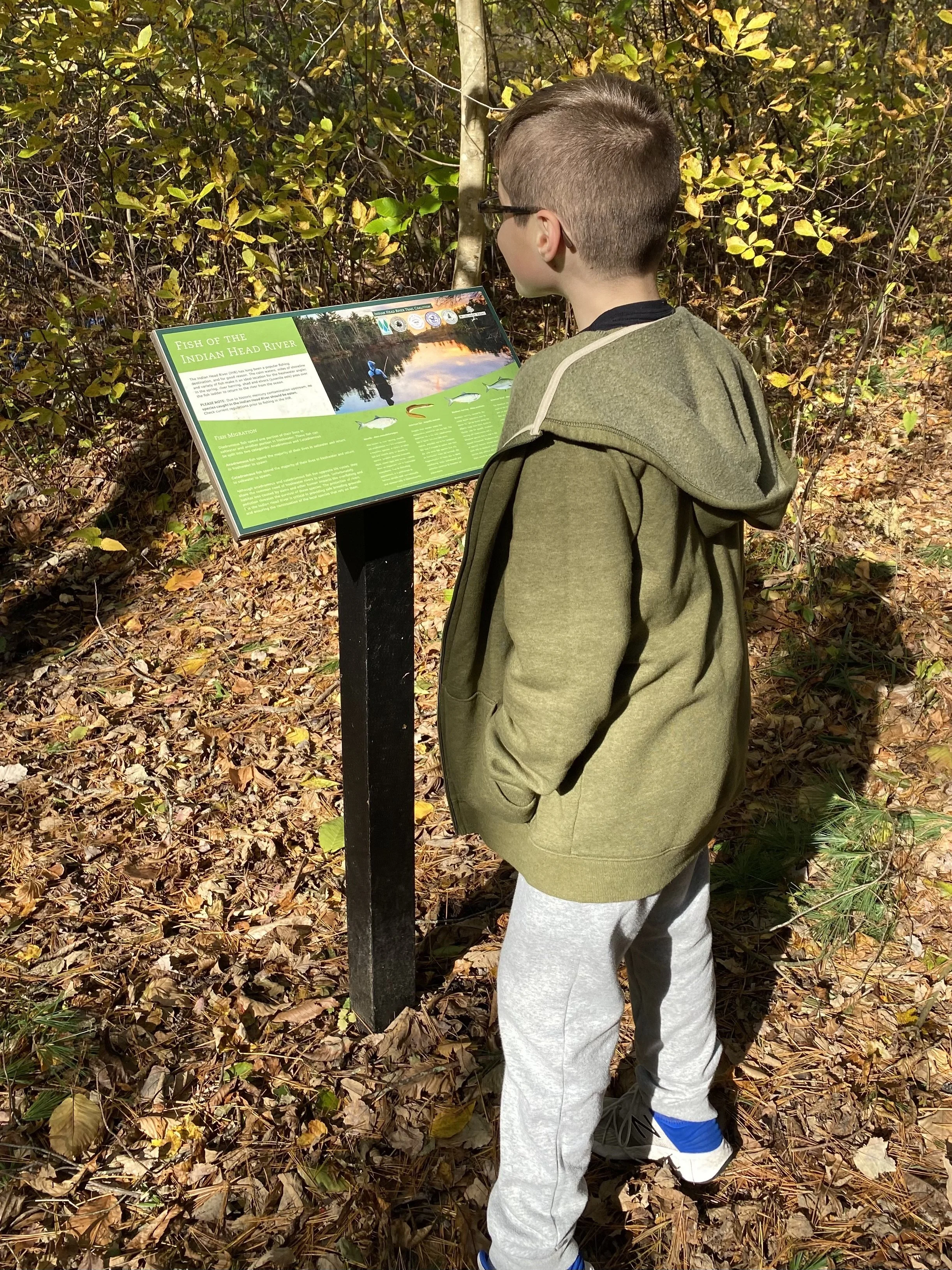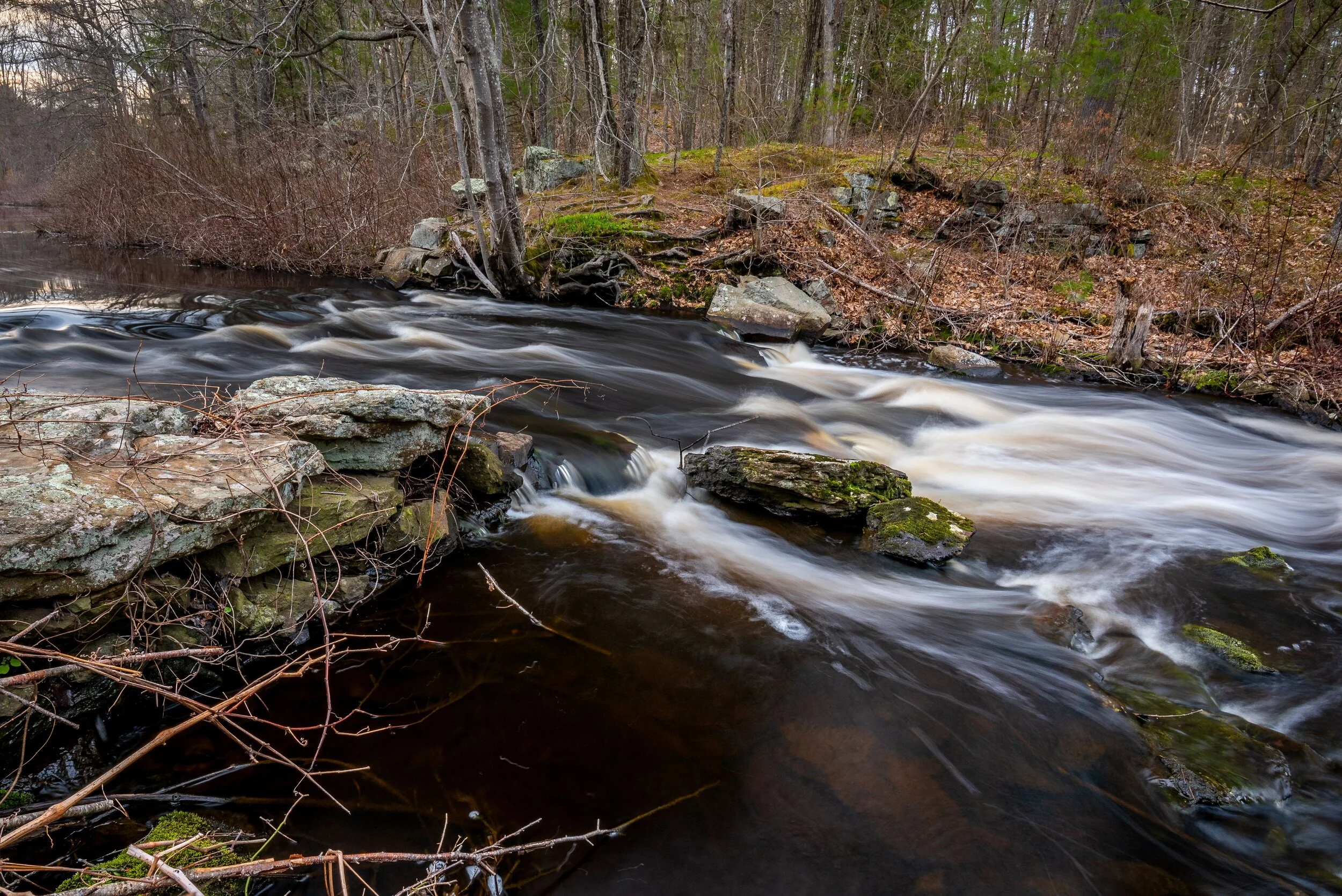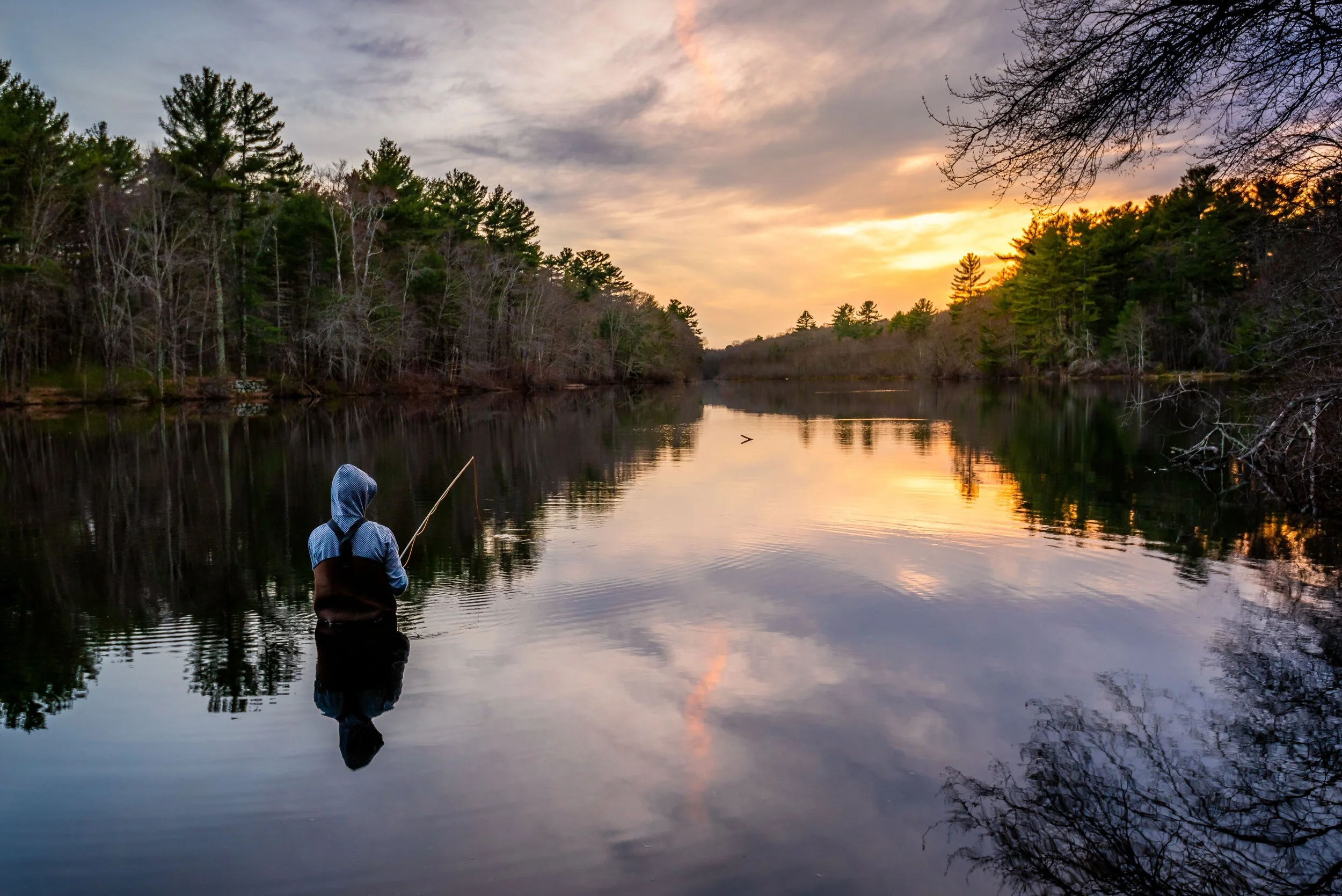What’s New at Wildlands
Indian Head River Coalition Completes Work on Multi-town Hiking Trail Loop
By Amy Markarian, Senior Copywriter
Read Time: 2 min
The Indian Head River Trail, a popular recreational trail system spanning the towns of Hanover, Hanson, and Pembroke, just received a 3-year makeover and it's ready for spring hiking season! The latest improvements welcome new and returning visitors with an enhanced trail experience for all.
In 2017, a group of landholding entities—the Pembroke, Hanover, and Hanson Conservation Commissions, Plymouth County, North and South River Watershed Association, and Wildlands Trust—formed the Indian Head River Trail Coalition (IHRTC) to preserve the historic and natural qualities of the Indian Head River and its surrounding lands, while also encouraging passive recreation in and around the river.
In 2018, the coalition was awarded a 3-year Massachusetts Department of Conservation and Recreation (DCR) Recreational Trails Program grant to expand and improve the Indian Head River trail system. Following completion of this work in late 2021, the area currently boasts six continuous miles of trail, connecting 325 acres of conservation land along the river. The neighboring trail systems of Wildlands Trust’s Tucker Preserve and Hanover’s Iron Mine Brook are now linked with the Indian Head River Trail, offering one complete loop incorporating the various conservation properties around the river.
The DCR funding supported both trail blazing and maintenance of existing trails to create the loop. In addition, it allowed for the installation of several new features, including: map holders and trail markers to improve navigability; signage providing ecological and historical information; 800 feet of “bog board” walkways over areas of trail deterioration; benches at scenic viewpoints; informational kiosks to welcome visitors at several entrances to the trail; and printed trail maps reflecting the newest changes to the expansive trail system.
In conjunction with the Indian Head River Trail Coalition, local volunteers provided critical assistance throughout the project. Led by Wildlands Trust’s director of stewardship Erik Boyer, volunteers from The Town of Hanover, Wildlands Trust, REI, the New England Mountain Bike Association (NEMBA), and a Hanover boy scout troop assisted with trail clean up, installation of trail enhancements, ongoing trail monitoring (through Wildlands’ Adopt-a-Preserve program), and guided hikes to introduce new visitors to the trail system. Assistance with historical content pertaining to the Mattakeeset Tribe was provided by Dr. Larry Fisher.








Indian Head River Trail Enhancements Continue Thanks to the Efforts of Many
Following centuries of changes along the Indian Head River, the towns of Pembroke, Hanson and Hanover work together with Wildlands Trust to improve the surrounding trail system with a MassTrails Program grant.
By Community Stewardship Program Manager Conor Michaud
Rivers are the multi-tool of the natural world, harnessed by people, they support burgeoning populations and have played a key role in shaping our civilization. Before industrialized society, rivers were free-flowing. Unobstructed by dams and development, these waters naturally deposited nutrients and sediments along the river corridor, housed essential native breeding grounds for migratory fish and provided for a biodiverse ecosystem. Today, free-flowing rivers are globally threatened, with only several remaining in Massachusetts and the North River being the only one in Wildlands’ service region.
What remains of the Waterman Tack Factory dam rest along the shores of the IHR.
The Indian Head River (IHR), a tributary of the North River, was transformed from its free-flowing state centuries ago. Throughout the 17th century and up until the early 20th century, the IHR fueled the local economy and proved an invaluable resource. As industry left the river, mills eventually ceased production, dams collapsed and the forges cooled. The train which once ran along the shoreline is long gone, its former path converted into a nature trail some years ago. For nearly four miles, the river now flows peacefully through Pembroke, Hanover and Hanson, and in many places, large swathes of the riparian corridor and forests have been conserved to help protect this treasured habitat.
In 1993, Wildlands was gifted Tucker Preserve in Pembroke, one of Wildlands’ most popular conservation areas. The northern side of Tucker sits against the IHR, affording hikers stunning views and fishing access, while the southern upland forest showcases shady hemlock stands and old rock walls, vestiges of former agricultural land. The three towns through which the IHR flows — Pembroke, Hanover and Hanson — have each conserved land along its banks and in 2018, Pembroke received funding from the Department of Conservation and Recreation’s MassTrails Program to improve the trail system on the surrounding conservation lands and increase public stewardship along the river. Over the last two years, Wildlands has managed the IHR Trail Project for the town, working with representatives from Pembroke’s conservation commission, Hanover and Hanson’s open space committees, Hanover’s Department of Public Works, and the North and South Rivers Watershed Alliance to enhance the 4-mile trail loop encircling the IHR.
The Indian Head River flowing east from State Street.
Adequately protecting the IHR, its riparian areas and nearby upland forests requires more than trail stewardship though, it requires volunteer contributions and the devotion of local residents who will continue to assist in conservation efforts long after the MassTrails grant is complete. Throughout the IHR Project, Wildlands has focused on public outreach through guided hikes, volunteer trail work events and recruitment of volunteers to our Adopt-A-Preserve program. From these efforts, a tremendous amount of volunteer support has been shown, with over $7,000 of volunteer match time collected. Most recently, local photographer Andrew Lederman generously donated his time and skills to document the preserve’s natural beauty, as well as the remnants of the IHR’s former industrial life (featured in this article). Earlier this spring, Hanover’s Department of Public Works assisted Wildlands in creating a formal parking area along Water Street, a welcome addition as trail usage continues to grow, and this summer, Wildlands will work with a boy scout from Hanover to install new trailhead kiosks and educational signs along the trail system.
Massachusetts has a long industrial history, from the massive farming culture during the 18th and 19th centuries, to mills and factories that dammed our rivers, altered the landscape and ultimately shaped our communities. The IHR Conservation Area and the IHR Trail Project are opportunities for us to study our industrial past and the impacts of having manipulated the formerly free-flowing river. The IHR Conservation Area provides a space to track the native fish species which struggle to navigate the Luddam’s Ford fish ladder, shedding light on the impacts of dams and the benefits of protecting natural free-flowing rivers. Most importantly, the IHR Trail Project demonstrates a collaborative success and the importance of spanning town boundaries to protect what little conservation land remains in our rapidly developing towns.
The Indian Head River is an incredible resource and outdoor enthusiasts, anglers and families seek its utilities all year long. Offering miles of trails, fishing, picnicking and water craft recreation, the IHR stands out as a top nature destination in the South Shore. With the recent COVID-19 pandemic, Wildlands has seen a surge in trail users. On weekends, the parking lots are often filled and the shores are lined with hopeful fishermen and women. Wildlands reminds you to please stay on marked trails, pickup and carry out your dog’s waste, and respect fellow hikers by following social distance guidelines. Our work at Tucker Preserve and the IHR is successful because of our dedicated volunteer base and the people who respect these natural spaces. If you are interested in learning how you can help protect your conservation land please send us an email (info@wildlandstrust.org) or give us a call (774-343-5121).
Wildlands Teams Up with Sierra Club for Volunteer Service Week
By Stewardship Manager, Erik Boyer
Sierra Club volunteers and Wildlands staff pose for a group photo at Myles Standish State Forest.
This past August, twenty-four volunteers from the Sierra Club joined Wildlands Trust for a week of service on some of our trails on the South Shore. The group consisted of volunteers from all over the country who dedicated their time from August 5 – August 9 and helped improve the trails at Wildlands’ Tucker Preserve and the Equestrian Loop at Myles Standish State Forest. This is the fourth year of this partnership, which focuses primarily on volunteer work at Wildlands but has included service projects with the town of Plymouth and the Friends of Myles Standish.
This year, for the first time, we spent a day outside of Plymouth on the Indian Head River in Pembroke and Hanover. The first day, the group spent the day cutting back trails on the Indian Head River Loop (IHRL), a trail that passes through the towns of Pembroke, Hanover, and Hanson. A good portion of this work took place on Tucker Preserve, which is one of the entry points to the IHRL. A group also assisted a local Boy Scout for his Eagle Scout project, where they opened up the trails at the town of Hanover’s Iron Brook Mine Trails.
Sierra Club volunteers working together on a trail in Plymouth in 2017.
At the end of the week, the group worked with the Friends of Myles Standish and helped cut back vegetation on portions of the Equestrian Loop. Volunteers cut back the dense understory scrub oak and bayberry from the trails and cleared fallen trees with handsaws. Over 3 miles of trails were cleared over the course of two days!
Thanks to the efforts of Zehava Rosenberg and Madeleine Zember, two Sierra Club volunteers, over 20 volunteers come to Plymouth for a weeklong service trip each year. Due to the help of the volunteers this year, hikers will be able to enjoy these trails this fall. If you would like to learn more about the Sierra Club’s service trips, check out: content.sierraclub.org/outings/volunteer-vacations. For information on how you can volunteer with Wildlands Trust, visit our website at wildlandstrust.org/volunteer.




